
QUATERNAIRE
Scope & Guideline
Illuminating the Intricacies of Our Planet's Evolution.
Introduction
Aims and Scopes
- Paleoenvironments and Climate Change:
The journal extensively covers research related to paleoenvironments and climate variability throughout the Quaternary. This includes studies on glacial dynamics, sedimentary processes, and climatic impacts on ecosystems. - Archaeological and Anthropological Insights:
A significant focus is placed on the archaeological record and its relationship with past human populations, including cultural adaptations to climatic changes and the interactions between humans and their environment. - Geological and Geomorphological Studies:
The journal features a range of geological studies, emphasizing geomorphological processes, sedimentology, and chronostratigraphy, often using advanced dating techniques to reconstruct historical landscapes. - Multidisciplinary Approaches:
QUATERNAIRE promotes multidisciplinary research, integrating data from various scientific fields, such as geology, biology, archaeology, and environmental science, to provide comprehensive insights into Quaternary studies.
Trending and Emerging
- Climate-Driven Ecological Changes:
There is a growing emphasis on understanding how climate shifts have driven ecological and environmental transformations, as evidenced by studies on speleothems, sedimentary processes, and vegetation dynamics across various geographical contexts. - Human-Environment Interactions:
Research exploring the interactions between human populations and their environments during the Quaternary is on the rise. This includes investigations into Neanderthal adaptations and archaeological findings that illustrate these dynamics. - Advanced Dating Techniques:
The use of innovative dating methods, such as uranium-series, ESR, and optically stimulated luminescence dating, is increasingly prevalent in recent publications, allowing for more precise chronological frameworks and a better understanding of temporal changes. - Integration of Multidisciplinary Data:
Emerging studies are increasingly integrating data from diverse fields, such as paleobiology, sedimentology, and archaeology, to create comprehensive models of past environments and their evolution, reflecting a trend towards holistic approaches in Quaternary research.
Declining or Waning
- Traditional Geological Surveys:
There has been a noticeable decline in purely descriptive geological surveys, as the journal increasingly favors studies that integrate multiple disciplines and methodologies to provide deeper insights into environmental changes. - Focus on Recent Holocene Studies:
The emphasis on recent Holocene studies appears to be waning in favor of more extensive investigations into earlier Quaternary periods, particularly the Pleistocene, which may reflect a shift towards understanding longer-term climate dynamics. - Faunal Studies in Isolation:
Research focusing solely on faunal studies without contextual environmental or anthropological analysis is becoming less common, indicating a trend towards more integrated studies that examine faunal changes alongside human impacts and climatic shifts.
Similar Journals
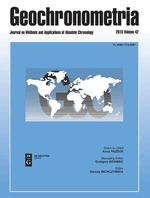
Geochronometria
Transforming Geological Understanding for Two DecadesGeochronometria is a renowned journal dedicated to the field of Earth and Planetary Sciences, published by SCIENDO in Germany. With a history spanning over two decades since its inception in 2000, it has established itself as a key platform for disseminating innovative research and methodologies in geochronology, radiometric dating, and related disciplines. Currently, it holds a respectable Q2 ranking in the subject area, showcasing its relevance and influence, particularly with a Scopus rank of #92 out of 159 journals in Earth and Planetary Sciences, which places it in the 42nd percentile. This journal is committed to facilitating open discussions and advances in understanding geological time scales and processes, making it an essential resource for researchers, professionals, and students alike. Although it is not an open-access journal, its significant contributions to the scientific community underscore its pivotal role in advancing knowledge within the field.
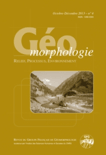
Geomorphologie-Relief Processus Environnement
Driving Research in Earth-Surface InteractionsGeomorphologie-Relief Processus Environnement is a pivotal journal in the field of Earth-Surface Processes, published by the GROUPE FRANCIAS GEOMORPHOLOGIE in France. With an ISSN of 1266-5304 and E-ISSN 1957-777X, the journal has established a notable presence since its inception in 1995. Though it operates without Open Access, it remains an essential resource, particularly in the niche area of geomorphology where it offers valuable insights into the interactions between relief features and environmental processes. The journal achieved a Q3 ranking in 2023 among Earth-Surface Processes, attesting to its significance in advancing research and discussions within this discipline, while it ranks #113/179 in Scopus, placing it in the 37th percentile. By fostering interdisciplinary dialogue and disseminating high-quality research, Geomorphologie-Relief Processus Environnement serves as a vital platform for researchers, professionals, and students eager to explore the complexities of our planet's surface processes.
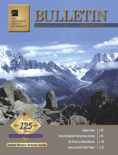
GEOLOGICAL SOCIETY OF AMERICA BULLETIN
Uncovering Geological Truths, One Bulletin at a TimeThe Geological Society of America Bulletin (GSA Bulletin), with ISSN 0016-7606 and E-ISSN 1943-2674, is a premier scholarly journal published by Geological Society of America, Inc. Based in the United States, this journal has been a cornerstone of geological research since its inception in 1890, making significant contributions to the understanding of Earth sciences over more than a century. Recognized for its rigorous peer-review process, the GSA Bulletin currently holds a prestigious Q1 ranking in Geology, positioning it among the top 14 journals in Earth and Planetary Sciences in terms of Scopus ranking, reflecting the high quality and impact of the research it publishes. Researchers, professionals, and students alike benefit from its comprehensive coverage of geological topics, including sedimentology, volcanology, and paleontology, which supports the advancement of knowledge in the geosciences. While the journal is not open access, it continues to provide a vital platform for innovative research and critical discussions that shape the future of geology.
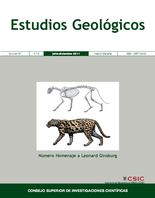
ESTUDIOS GEOLOGICOS-MADRID
Unveiling Geological Insights for a Sustainable Future.ESTUDIOS GEOLOGICOS-MADRID is a prominent journal in the field of geology, published by the esteemed Consejo Superior de Investigaciones Científicas (CSIC) in Spain. Established in 1976, this Open Access journal has been a vital resource for researchers and professionals since its inception. With an impact factor reflecting its contribution to the Earth and Planetary Sciences community, ESTUDIOS GEOLOGICOS-MADRID currently holds a Q3 category ranking in Geology as of 2023, showcasing its relevance and quality within the discipline. The journal publishes a diverse array of geological studies, ensuring wide-reaching access to significant research findings, thereby promoting collaboration and knowledge sharing. Established as a platform for both foundational research and applied geology, this journal fosters academic growth and contributes to understanding the Earth’s processes. Researchers, professionals, and students are encouraged to explore its extensive archive, which includes publications from 1976 to the present. For more information, visit the journal's editorial office at Editorial CSIC, C/VITRUVIO 8, 28006 MADRID, SPAIN.

E&G Quaternary Science Journal
Fostering Global Insights in Quaternary ResearchE&G Quaternary Science Journal, published by COPERNICUS GESELLSCHAFT MBH in Germany, stands as a prominent open-access platform dedicated to disseminating high-quality research in the fields of archaeology, geology, paleontology, and stratigraphy since its inception in 1979. With its ISSN 0424-7116 and E-ISSN 2199-9090, the journal has achieved remarkable recognition, indicated by its Q1 quartile ranking in archaeology across both arts and humanities sections, and its strong placements within the social sciences and Earth sciences categories. The journal provides crucial insights into the Quaternary period, contributing to our understanding of climate change, human evolution, and geological processes, making it invaluable for researchers, professionals, and students engaged in these collaborating disciplines. As an open-access journal since 2008, it ensures that cutting-edge research is readily available to a global audience, promoting knowledge exchange and facilitating advancements within the scientific community. The continuous commitment to excellence and its strategic focus on high-impact research positions E&G Quaternary Science Journal as a cornerstone publication in quaternary science.
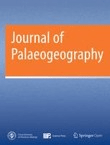
Journal of Palaeogeography-English
Exploring Earth's Past, Enriching Our FutureThe Journal of Palaeogeography-English, published by Elsevier Science Inc, is a leading peer-reviewed open access journal that has been an essential resource for researchers since its establishment in 2012. With its focus on Earth-Surface Processes, Geography, Planning, Development, and Paleontology, the journal has secured a premier position in the academic community, recently achieving Q1 category rankings in multiple fields. The journal's current impact is reflected in its Scopus rankings, placing it in the top percentile of its categories, such as rank #12 in Paleontology and #39 in Earth-Surface Processes. With open access options, it facilitates wide dissemination and engagement with high-quality research, making significant contributions to our understanding of geographical and paleontological phenomena. As the journal converges towards 2024, it aims to continue fostering innovative research and interdisciplinary dialogue that will stimulate advancements in our knowledge of Earth’s past and present environments, appealing to a diverse audience of researchers, professionals, and students alike.
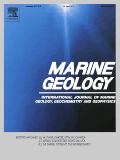
MARINE GEOLOGY
Charting New Frontiers in Marine Geological Research.MARINE GEOLOGY, published by Elsevier, is a premier journal dedicated to advancing the understanding of marine geological processes and their interactions with the Earth's systems. With an ISSN of 0025-3227 and an E-ISSN of 1872-6151, this esteemed journal has been a vital resource for researchers and professionals since its inception in 1964. The journal is recognized for its high impact, with commendable rankings, including Q1 in both Geology and Oceanography, and Q2 in Geochemistry and Petrology according to its 2023 category quartiles. With a Scopus rank within the top percentiles in various fields, MARINE GEOLOGY offers a platform for original research, critical reviews, and significant advancements in the field, covering topics ranging from sedimentology to geochemical processes in marine environments. Although it does not operate under an open-access model, its rigorous peer-review process ensures high-quality publications that contribute to our understanding of oceanic and geological sciences. Researchers, students, and professionals alike will find MARINE GEOLOGY to be an essential resource for collaboration and discovery within the vast field of marine science.
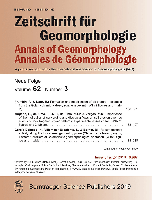
ZEITSCHRIFT FUR GEOMORPHOLOGIE
Exploring the Dynamics of Earth's Surface.ZEITSCHRIFT FUR GEOMORPHOLOGIE is a prestigious journal dedicated to the field of geomorphology, published by GEBRUDER BORNTRAEGER from Germany. With the ISSN 0372-8854 and E-ISSN 1864-1687, this journal serves as a vital platform for researchers, professionals, and students interested in understanding the dynamic processes that shape our Earth’s surface. The journal has consistently maintained a solid academic reputation, achieving a Q3 ranking in key categories including Earth and Planetary Sciences (miscellaneous), Earth-Surface Processes, and Geography, Planning and Development as of 2023. This reflects its position within the global scientific community; ranked at #93 out of 179 in Earth-Surface Processes, contributing to crucial discussions surrounding environmental changes and landform evolution. Although ZEITSCHRIFT FUR GEOMORPHOLOGIE is not an Open Access publication, it offers extensive insights and findings from converged years spanning from 1979 to 2019 and again from 2021 to 2022. The journal is located at Johannesstr 3A, D-70176 Stuttgart, Germany, and plays a pivotal role in advancing geomorphological research that impacts natural sciences, ecology, and planning strategies worldwide.
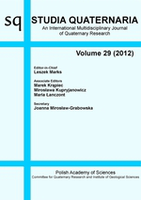
Studia Quaternaria
Advancing knowledge of Earth's dynamic processes.Studia Quaternaria is a leading academic journal published by the Polish Academy of Sciences, Institute of Geological Sciences, specializing in the dynamic fields of Earth-Surface Processes and Geology. With an ISSN of 1641-5558 and an E-ISSN of 2300-0384, this journal has been a prominent platform for scholarly discourse since its inception in 2000. Operating under the open-access model, it aims to disseminate high-quality research that is accessible to a global audience. Studia Quaternaria holds a Q3 ranking in both relevant quartiles as of 2023, indicating its commitment to advancing knowledge in its disciplines despite centering in competitive academic environments. With its publications indexed in Scopus, the journal remains a valuable resource for researchers, professionals, and students looking to stay abreast of innovations and discoveries in Earth-Surface Processes and Geology. Encompassing a broad scope of studies, the journal represents an essential contribution to the geological sciences, fostering a deeper understanding of our planet's changes and processes.

Palaeoworld
Decoding the Ecological Narratives of Our Planet's PastPalaeoworld is a leading peer-reviewed journal published by ELSEVIER, focusing on the dynamic and interdisciplinary fields of paleontology, ecology, and stratigraphy. Established in 2006, the journal aims to facilitate the dissemination of innovative research and significant discoveries that enhance our understanding of past life on Earth. With an impressive impact factor and categorized in the second quartile (Q2) for Ecology, Evolution, Behavior and Systematics, Paleontology, and Stratigraphy in 2023, Palaeoworld stands out in its commitment to high-quality scholarship. The journal is indexed in Scopus, ranking #23 in Paleontology and #14 in Stratigraphy, placing it within the top 20% of publications in these categories. As a valuable resource for researchers, professionals, and students alike, it provides unrestricted access to cutting-edge findings, detailed methodologies, and critical assessments of paleo-environmental data. This journal is not only a repository of knowledge but also a platform for advancing discussions that bridge past ecological patterns with contemporary issues.